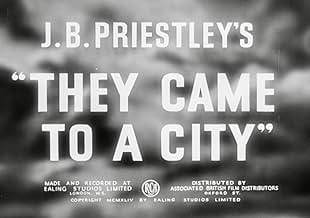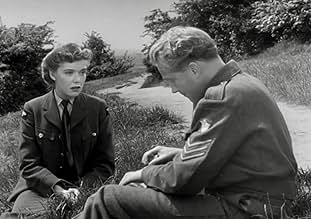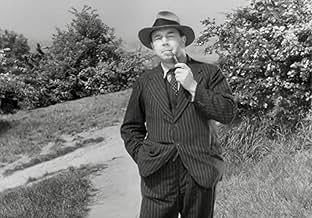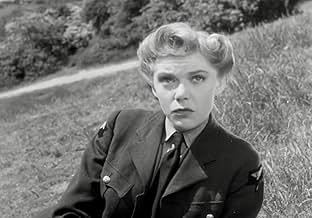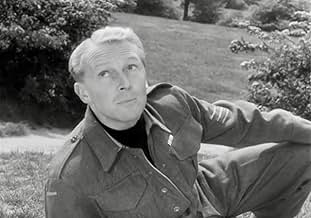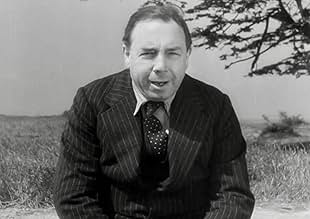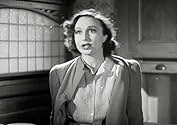Agrega una trama en tu idiomaAdapted from a J.B. Priestley play with many of the original actors. The tale of various people who have come to live in an "ideal" city and their hopes and reasons for doing so.Adapted from a J.B. Priestley play with many of the original actors. The tale of various people who have come to live in an "ideal" city and their hopes and reasons for doing so.Adapted from a J.B. Priestley play with many of the original actors. The tale of various people who have come to live in an "ideal" city and their hopes and reasons for doing so.
- Dirección
- Guionistas
- Elenco
Mabel Terry-Lewis
- Lady Loxfield
- (as Mabel Terry Lewis)
Fanny Rowe
- Philippa Loxfield
- (as Frances Rowe)
Brenda Bruce
- WAAF
- (sin créditos)
Ralph Michael
- Sergeant Jimmy
- (sin créditos)
J.B. Priestley
- J.B. Priestley
- (sin créditos)
Johnnie Schofield
- Bert the Barman
- (sin créditos)
Opiniones destacadas
Nine disagreeable Britons representing different social/economic classes are mysteriously transported to a place with a door. As they wait for the door to open, we get to know them better. Eventually the door opens, and they go explore a city which the audience never sees. T The idea is that post WW2, England should become a more fair and equitable society with people who treat each other well. When the characters find themselves in such a city they have different reactions. It's interesting how some of the selfish ones try to emotionally drag those who want to live in the city back to their miserable lives. There is an episode involving a mother and daughter that is very similar to an episode in C. S. Lewis' novel "The Great Divorce" written 12 years later. It made me wonder if Mr. Lewis ever saw the film. Note: "They Came To A City" is similar to watching a stage play. At only 66 minutes long it's worth a look.
I usually enjoy malcolmgsw's reviews but this time we have to agree to differ: I consider this, far from being the worst British film, rather amongst the best. Of course, it depends upon what one considers important, how one views our history and the changes in politics. Not long ago, millions of Brits had a vision of a better and more just way of managing things and hopes for a better life for all. This film may have helped the Attlee government gain power the next year, but now all is lost and gone since Clause 4 was thrown out in 1995. The present generation is unhappy but doesn't seem interested in the hopes which this film is concerned with. The acting and the lighting effects are powerful, so it really wouldn't do to sit with one's eyes shut. Of course, if you're hoping for light entertainment and giggles, this film is not for you. It ought to be mentioned that the verse of poetry is taken slightly out of context: 'I dreamed that was the new city of Friends' with a capital 'F', meaning Quakers. It was about the hopes for the founding of Philadelphia in 1681. When a child, Walt Whitman was deeply influenced by a powerful Quaker preacher, and it shows in verses such as this. I can't imagine Whitman would mind his words being applied to this story.
Lovely piece about assorted people who discovered a happy land far far away - and some found it happier than others. But as noted elsewhere, the Utopia is portrayed without any explanation of how we got there. As another reviewer says, it captured the mood of the times. That mood produced the Attlee government - and after six years of it, it took another 13 before Labour got in again - and Harold Wilson had the sense not to promise Utopia. Unfortunately, The comparison with Lost Horizon is very apt, but Shangri-La doesn't work without it's supernatural elements - which unfortunately we don't possess.,
A British drama; A story about how people might live if they were presented with the opportunity to live in a utopia, an "ideal" city, exploring their hopes and reasons for doing so. This is an eloquent, stagy allegory based on a play of the same title by J. B. Priestley. The direction, acting, and photography are all good, apart from occasional fits of overcooked melodrama within its bounds. It is an intelligent screenplay, but the tale within it lacks cinematic dimension with long, static sequences of dialogue; the audience is robbed of the pictorial element of what is hinted at about the mysterious settlement. Tied to this is a quite heavy political slant in the script, which is left for the viewer to accept as a task rather than for them to explore by diversion; the audience is locked out. Though the theme of universal friendship is explored well.
THEY CAME TO A CITY is based on a play by J.B. Preistley and stars Googie Withers and John Clements. It's sort of an "Outward Bound" story of disparate people who find themselves on a road that leads to a monolithic waiting room before a giant door. While waiting, each person explains his/her life, hopes, gripes, etc. When the door finally opens they descend in "the city." We never see it. As they emerge from the city, some are struck by the new social order, happiness of the people, the freedom, etc. while others are repelled by what they see. This utopia seems based on socialist views.
Coming toward the end of WWII, the story is framed by a couple sitting by a roadside overlooking a manufacturing city. They are arguing about what kind of world will emerge after the war. Will things be different. A man wanders by (J.B. Priestley himself) and he joins in, telling the story of his utopia.
Those who hate "the city" include a selfish dowager who browbeats her mousy daughter, a man of the landed gentry who lives on inherited money, a ruthless industrialist who makes money in order to make more money, and a jealous wife who hates anyone to has the things she wants. Those who like the city include the mousy daughter, an old charwoman, the henpecked husband, the world-weary barmaid (Withers), and the stoker (Clements) who has searched the world for a paradise.
While not very cinematic, the overall idea is quite interesting, and the actors (mostly from the stage play) are quite good. Besides Withers and Clements, the film co-stars Raymond Huntley and Renee Gadd as the Strittons, Ada Reeve as the charwoman, Mabel Terry-Lewis and Frances Rowe as the dowager and daughter, A.E. Matthews as the industrialist, Norman Shelley as the landed gentry.
Coming toward the end of WWII, the story is framed by a couple sitting by a roadside overlooking a manufacturing city. They are arguing about what kind of world will emerge after the war. Will things be different. A man wanders by (J.B. Priestley himself) and he joins in, telling the story of his utopia.
Those who hate "the city" include a selfish dowager who browbeats her mousy daughter, a man of the landed gentry who lives on inherited money, a ruthless industrialist who makes money in order to make more money, and a jealous wife who hates anyone to has the things she wants. Those who like the city include the mousy daughter, an old charwoman, the henpecked husband, the world-weary barmaid (Withers), and the stoker (Clements) who has searched the world for a paradise.
While not very cinematic, the overall idea is quite interesting, and the actors (mostly from the stage play) are quite good. Besides Withers and Clements, the film co-stars Raymond Huntley and Renee Gadd as the Strittons, Ada Reeve as the charwoman, Mabel Terry-Lewis and Frances Rowe as the dowager and daughter, A.E. Matthews as the industrialist, Norman Shelley as the landed gentry.
¿Sabías que…?
- TriviaFinal film of Mabel Terry-Lewis.
- Citas
Alice Foster: I never thought there *could* be a place as good as this.
- ConexionesFeatured in Sosialismi (2014)
- Bandas sonorasMusic selected from The Divine Poem
Music by Aleksandr Skryabin (as Scriabin)
Played by The London Philharmonic Orchestra
Conducted by Ernest Irving
Selecciones populares
Inicia sesión para calificar y agrega a la lista de videos para obtener recomendaciones personalizadas
Detalles
- Tiempo de ejecución1 hora 18 minutos
- Color
- Relación de aspecto
- 1.37 : 1
Contribuir a esta página
Sugiere una edición o agrega el contenido que falta

Principales brechas de datos
By what name was They Came to a City (1944) officially released in India in English?
Responda
